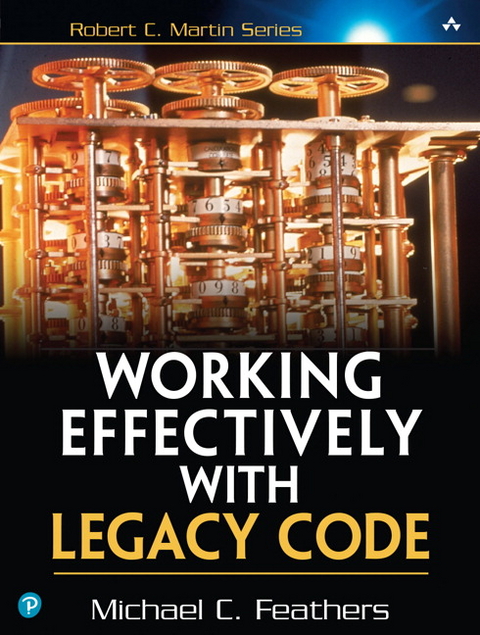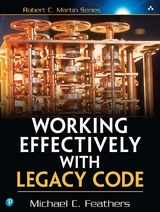Working Effectively with Legacy Code
Pearson (Verlag)
978-0-13-117705-5 (ISBN)
MICHAEL C. FEATHERS works for Object Mentor, Inc., one of the world's top providers of mentoring, skill development, knowledge transfer, and leadership services in software development. He currently provides worldwide training and mentoring in Test-Driven Development (TDD), Refactoring, OO Design, Java, C#, C++, and Extreme Programming (XP). Michael is the original author of CppUnit, a C++ port of the JUnit testing framework, and FitCpp, a C++ port of the FIT integrated-testing framework. A member of ACM and IEEE, he has chaired CodeFest at three OOPSLA conferences. © Copyright Pearson Education. All rights reserved.
I. THE MECHANICS OF CHANGE.
1. Changing Software.
2. Working with Feedback.
3. Sensing and Separation.
4. The Seam Model.
5. Tools.
II. CHANGING SOFTWARE.
6. I Don’t Have Much Time and I Have To Change It.
7. It Takes Forever To Make a Change.
8. How Do I Add a Feature?
9. I Can’t Get This Class into a Test Harness.
10. I Can’t Run This Method into a Test Harness.
11. I Need to Make a Change. What Methods Should I Test?
12. I Need to Make Many Changes In One Area Do I Have To Break.
13. I Need To Make a Change but I Don’t Know What Tests To Write.
14. Dependencies on Libraries Are Killing Me.
15. My Application Is All API Calls.
16. I Don’t Understand the Code Well Enough To Change It.
17. My Application Has No Structure.
18. My Test Code Is in the Way.
19. My Project Is Not Object-Oriented. How Do I Make Safe Changes?
20. This Class Is Too Big and I Don’t Want It to Get Any Bigger.
21. I’m Changing The Same Code All Over the Place.
22. I Need To Change a Monster Method and I Can’t Write Tests for It.
23. How Do I Know That I’m Not Breaking Anything?
24. We Feel Overwhelmed. It Isn’t Going To Get Any Better.
III. DEPENDENCY BREAKING TECHNIQUES.
25. Dependency Breaking Techniques.
Appendix: Refactoring.
Glossary.
| Reihe/Serie | Robert C. Martin Series |
|---|---|
| Verlagsort | Upper Saddle River |
| Sprache | englisch |
| Maße | 175 x 231 mm |
| Gewicht | 740 g |
| Themenwelt | Informatik ► Software Entwicklung ► Agile Software Entwicklung |
| Informatik ► Software Entwicklung ► Qualität / Testen | |
| Schlagworte | Software Engineering / Softwareentwicklung • Softwareentwicklung • Software-Wartung |
| ISBN-10 | 0-13-117705-2 / 0131177052 |
| ISBN-13 | 978-0-13-117705-5 / 9780131177055 |
| Zustand | Neuware |
| Haben Sie eine Frage zum Produkt? |
aus dem Bereich




